The holiday season is a time in which many families spend time together celebrating. According to Statista, in 2022, 70% of U.S. adults said they looked forward to getting together with their family and friends. However, for some, the challenge lies in staying connected to family members who live far from home, especially in distant, rural areas where access to technology and reliable communication networks may be limited. For sophomore Farrell Bopda Fotso, maintaining communication with his relatives goes beyond simple texting or calling.
“My family came from a rural area in Cameroon,” Bopda Fotso said. “Pretty much all the generations before me used to live around there.”
Bopda Fotso said communication with his relatives in remote areas goes far beyond basic messaging.
“Me and my family maintain communication through phone, direct calls, WhatsApp and through texts and occasional group calls,” Bopda Fotso said.
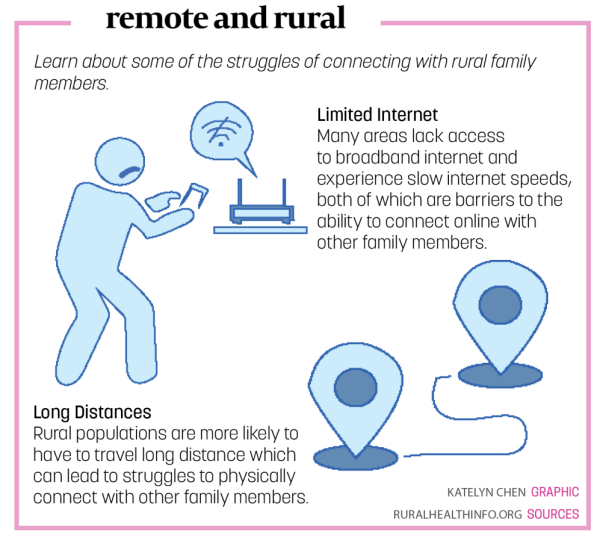
For him and many others, staying in touch with rural family members is not just about contacting them, but also keeping connections alive. Sophomore Atharva Sahu shared a similar experience in connecting with his family in India.
“We maintain communication through messaging and calling,” Sahu said.
Spanish teacher Gabriela Mendoza, who has family in Mexico, said she uses similar means, noting that cell phones are still a common way of staying connected.
“Where my family is, we still have cell phones,” Mendoza said. “So we text every day and have a family chat.”
However, Bopda Fotso said there are some challenges when it comes to communication in rural areas.
“Sometimes in rural areas there is little to no data, and if you have internet it is weak, due to having a lack of service,” Bopda Fotso said.
Sahu said while many of his family members do not have Wi-Fi, they are still able to communicate with one another.
“Most of them do have phones and some sort of cellular network, so calling them through both audio and video still works,” Sahu said.
Mendoza said while communication is manageable, the real difficulty lies in visiting family and friends in person.
“I would say for me, it’s more of a challenge to go there as often and see my family, because it’s expensive to fly there all the time,” Mendoza said.
Bopda Fotso agreed with this, adding how visiting his family and friends in Cameroon benefits them in many ways.
“Talking to them in person leads to having healthier conversations, and also being able to help with daily tasks helps their cause greatly,” Bopda Fotso said.
Mendoza concurred with this, mentioning how her family’s relationship strengthens.
“I really feel like we get to be more in tune with spending time with each other and more family time,” Mendoza said. “We can watch TV if we want to, but a lot of the activities we do, we tend to be outside more.”
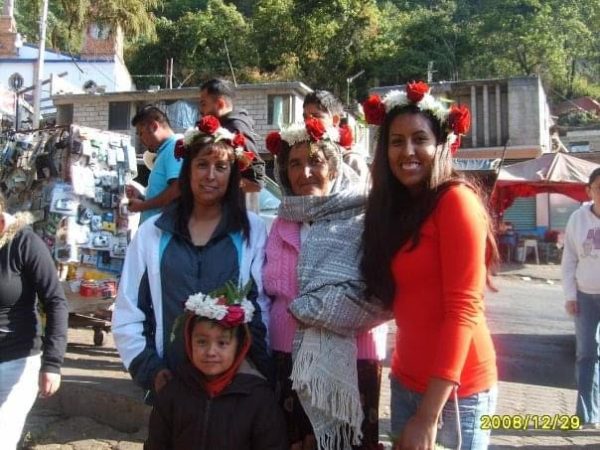
Sahu shared a similar feeling, but mentioned the deeper significance of visiting family in rural areas, noting that it allows him to connect with his roots.
“You get to see the origins of where a lot of your family came from,” Sahu said.
Bopda Fotso said the rural setting gave him a chance to take a break.
“The rural setting offers an opportunity to disconnect from all the problems going on in urban environments, and gives me a new perspective as to how I should take things,” Bopda Fotso said.
Mendoza felt similarly, appreciating the slower pace of life.
“Well, (in) the area where I’m from in Mexico, there’s not a lot of technology. You can have Wi-Fi and you can connect to the internet, but it’s not as reliable and easy, so you’re kind of forced to slow down,” Mendoza said. “It’s nice because you get to spend a lot of time with people talking and just spending time together.”
Sahu said a positive aspect of the rural environment is it allows him to see other perspectives.
“You are able to get a sense of how other people in different situations and environments live,” Sahu said.
Bopda Fotso said he enjoyed purchasing goods that are unavailable here.
“I like not having to pay as much for farmer’s markets goods as you would in Carmel,” Bopda Fotso said.
Mendoza said it allows her to stay connected to the rural area.
“Well, having family in the rural area where I’m from means I stay connected,” Mendoza said. “Now we have a reason to go back home and just reconnect with where I’m from.”






















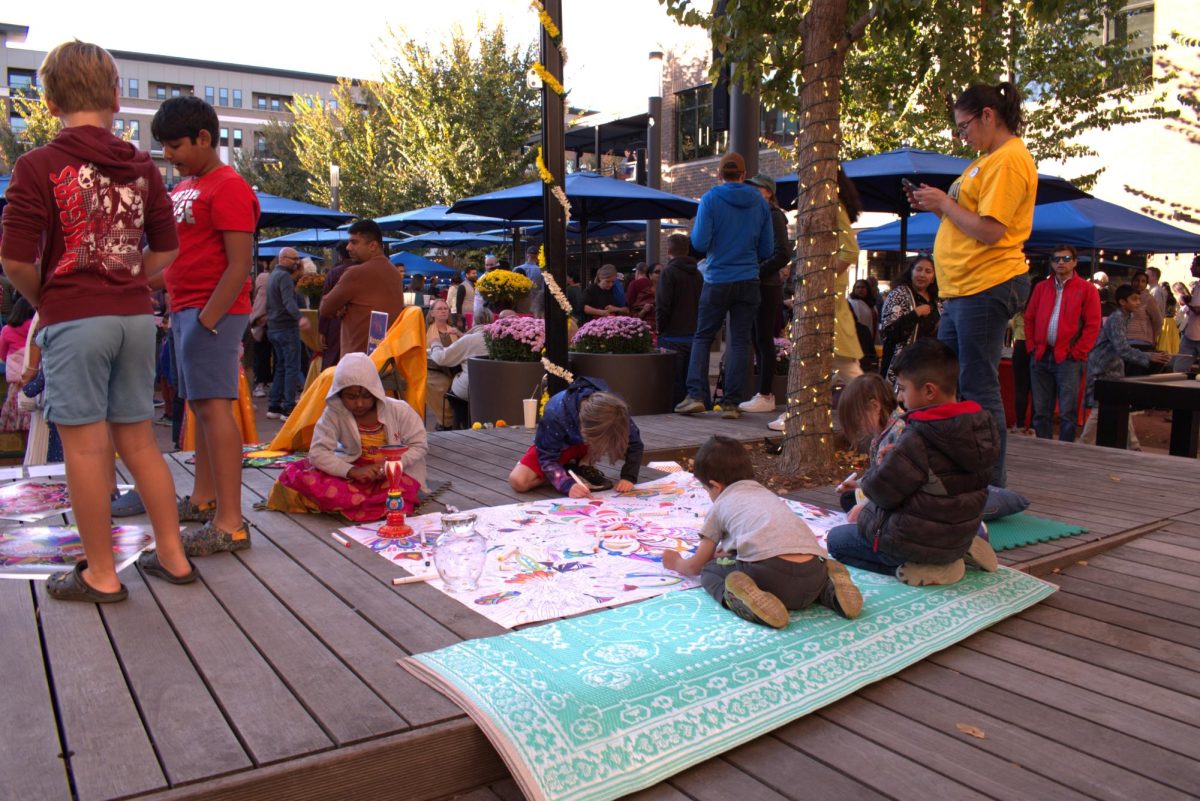


![Keep the New Gloves: Fighter Safety Is Non-Negotiable [opinion]](https://hilite.org/wp-content/uploads/2024/12/ufcglovescolumncover-1200x471.png)






!["Wicked" poster controversy sparks a debate about the importance of accuracy versus artistic freedom [opinion]](https://hilite.org/wp-content/uploads/2024/11/riva-perspective-cover-1200x471.jpg)









































![Review: “We Live in Time” leaves you wanting more [MUSE]](https://hilite.org/wp-content/uploads/2024/12/IMG_6358.jpg)
![Review: The premise of "Culinary Class Wars" is refreshingly unique and deserving of more attention [MUSE]](https://hilite.org/wp-content/uploads/2024/12/MUSE-class-wars-cover-2.png)
![Introducing: "The Muses Who Stole Christmas," a collection of reviews for you to follow through winter [MUSE]](https://hilite.org/wp-content/uploads/2024/12/winter-muse-4.gif)
![Review: "Meet Me Next Christmas" is a cheesy and predictable watch, but it was worth every minute [MUSE]](https://hilite.org/wp-content/uploads/2024/11/AAAAQVfRG2gwEuLhXTGm3856HuX2MTNs31Ok7fGgIVCoZbyeugVs1F4DZs-DgP0XadTDrnXHlbQo4DerjRXand9H1JKPM06cENmLl2RsINud2DMqIHzpXFS2n4zOkL3dr5m5i0nIVb3Cu3ataT_W2zGeDAJNd_E-1200x884.jpg)
![Review: "Gilmore Girls", the perfect fall show [MUSE]](https://hilite.org/wp-content/uploads/2024/11/gilmore-girls.png)
![Review in Print: Maripaz Villar brings a delightfully unique style to the world of WEBTOON [MUSE]](https://hilite.org/wp-content/uploads/2023/12/maripazcover-1200x960.jpg)
![Review: “The Sword of Kaigen” is a masterpiece [MUSE]](https://hilite.org/wp-content/uploads/2023/11/Screenshot-2023-11-26-201051.png)
![Review: Gateron Oil Kings, great linear switches, okay price [MUSE]](https://hilite.org/wp-content/uploads/2023/11/Screenshot-2023-11-26-200553.png)
![Review: “A Haunting in Venice” is a significant improvement from other Agatha Christie adaptations [MUSE]](https://hilite.org/wp-content/uploads/2023/11/e7ee2938a6d422669771bce6d8088521.jpg)
![Review: A Thanksgiving story from elementary school, still just as interesting [MUSE]](https://hilite.org/wp-content/uploads/2023/11/Screenshot-2023-11-26-195514-987x1200.png)
![Review: "When I Fly Towards You", cute, uplifting youth drama [MUSE]](https://hilite.org/wp-content/uploads/2023/09/When-I-Fly-Towards-You-Chinese-drama.png)
![Postcards from Muse: Hawaii Travel Diary [MUSE]](https://hilite.org/wp-content/uploads/2023/09/My-project-1-1200x1200.jpg)
![Review: "Ladybug & Cat Noir: The Movie," departure from original show [MUSE]](https://hilite.org/wp-content/uploads/2023/09/Ladybug__Cat_Noir_-_The_Movie_poster.jpg)
![Review in Print: "Hidden Love" is the cute, uplifting drama everyone needs [MUSE]](https://hilite.org/wp-content/uploads/2023/09/hiddenlovecover-e1693597208225-1030x1200.png)
![Review in Print: "Heartstopper" is the heartwarming queer romance we all need [MUSE]](https://hilite.org/wp-content/uploads/2023/08/museheartstoppercover-1200x654.png)



